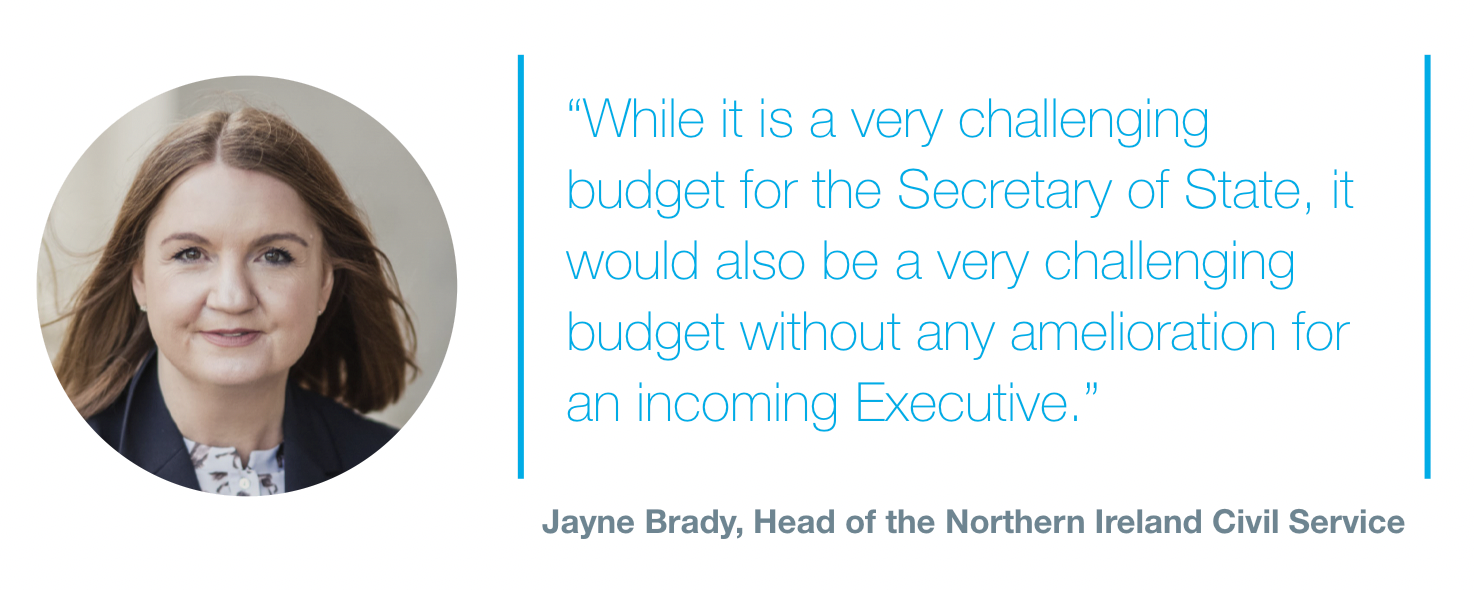Funding Northern Ireland’s public services

An inquiry by MPs examining the suitability of the Barnett formula in delivering a block grant for public services in Northern Ireland has heard evidence from senior civil servants.
Jayne Brady, the Head of the Northern Ireland Civil Service, and Neil Gibson, the Permanent Secretary of the Department of Finance responded to MPs on the Northern Ireland Affairs Committee in Westminster, which recently launched an inquiry into funding for Northern Ireland’s key public services.
The inquiry aims to establish the full ramifications for the funding of public services in the absence of failures to agree a multi-year budget for Northern Ireland since 2015.
Services under examination include health, education, and the police, while the inquiry will also look at how the lack of a functioning Executive has impacted on budgetary management within these services.
The committee is enquiring whether the Barnett formula is fit for purpose, on the back of some claims that Northern Ireland is not receiving its fair share in Treasury funding. Furthermore, MPs will examine the viability of other options for increasing revenue to put Northern Ireland’s finances on a more sustainable footing.
Describing the current financial situation in Northern Ireland as “extremely concerning, committee Chair Simon Hoare MP said: “With the Northern Ireland Assembly not sitting and the Executive absent, decisions on funding and spending will in effect be made in Westminster and by civil servants in Northern Ireland. This is less than ideal given the specific challenges faced by Northern Ireland.”
‘No V-shaped recovery’
Under questioning from committee chair Hoare, Head of the Northern Ireland Civil Service, Jayne Brady, stated that the Secretary of State’s recent budget could be “strategically very damaging” to Northern Ireland’s finances. “It is very helpful that there is amelioration of the £297 million [due to be repaid to UK Reserve following an overspend in 2022/23], so that we do not have a V-shaped recovery, which could be strategically very damaging to our finances,” stated Brady.
Questioning Brady, DUP MP Carla Lockhart asserted that “in Northern Ireland we get £1.21 for every £1 spent in England, despite our assessed need of £1.29,” subsequently enquiring on the impact on public services of this perceived imbalance in per capita funding.
Brady asserted that Northern Ireland’s comparatively rural population means that there is a need for a rise in per capita funding, although she did not directly address the Barnett formula. “These problems are not a product of the current situation; they will be there whatever the Executive. While it is a very challenging budget for the Secretary of State, it would also be a very challenging budget without any amelioration for an incoming Executive.
“The one to four percentage speaks to the need for that policy intervention and a longer-term perspective, so that our rurality, our need, and those aspects are filtered into that position.”
‘A conversation is needed’
Neil Gibson, the Department of Finance’s Permanent Secretary, added: “We are rapidly if not already at the point at which the funding per head is not at the level of measured need. There is a debate to be had about that measurement of need,” Gibson stated.
“The Fiscal Council has rightly used the same methodology used in Wales in the Holtham commission and tried to replicate that analysis. Northern Ireland has some other differences that might need consideration above and beyond the situation in Wales, but it is important to set even that empirical assessment in the context of how rapidly we are approaching that point, and the context in which we are doing it.”
Whilst spending per head is higher in Northern Ireland than other UK regions, Gibson asserted that this is necessary and seemingly, though not explicitly, agreed with the proposition that the Barnett formula be re-examined.
“If your level of funding per head is coming closer and closer to measured or objective need and potentially dipping below it, and you are doing that at a time of a significant cost-of-living crisis and inflationary pressures, it would be the worst and most challenging time to be on that particular trajectory.

“It is not the only conversation that needs to take place. The funding of public services and the measurement of need open up the conversation about other sources of revenue that might be available,” he continued.
“If you look at the analysis of need, many of the components of need are fixed, such as rurality or sparseness of population. But some are not, such as benefit dependency levels and long-term illness levels, and you want to be investing your money in ways that reduce that need in the future.”
Gibson, however, warned MPs that debates on the necessary funding model must go beyond examining the merits of the Barnett formula in place.
“While a discussion about a potential fiscal floor is certainly one of the conversations, it must not be framed in a narrative of the long-term vision being to have perpetual need. The long-term vision is to invest well so that the level of need might, in some areas, be less in the future, but to do that by dipping below that need in the teeth of the crisis we are facing is incredibly difficult, getting on to the transformational trajectory that you might want to get to,” Gibson concluded.





